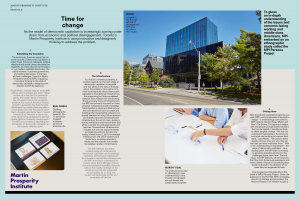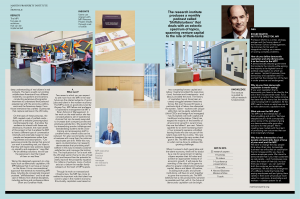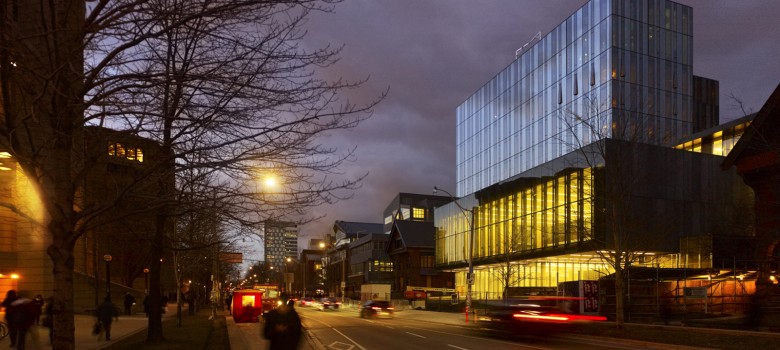From 2007 to 2019 The Martin Prosperity Institute explored the necessary requirements to achieve a prosperous future for all – one in which democracy and capitalism work in support of each other. It was housed at the University of Toronto’s Rotman School of Management, with a mission to develop a new understanding of the broader public conversation around shared and sustainable prosperity, an essential piece of democratic capitalism. Led by world leading thinkers Roger Martin, Richard Florida, and our renowned Fellows, our team sought to create an enduring prosperity for all.
We are at a historic inflection point, one that parallels the transition from agrarian feudalism to industrial capitalism. New modes of production are emerging, along with new models of success, new societal divides, and new models of governance. Our existing system is simultaneously teetering – the underpinnings of contemporary democratic capitalism, the very tenets that govern modern society, are increasingly exploited, strained, and unbalanced. If we are to produce shared prosperity, a positive agenda for the next stage of democratic capitalism is required.
See the article in Monocle Magazine
 |
 |
The Mindset
Far too often, the reports and opinions offered by think tanks miss the mark of transformational change because of two flawed assumptions: they fail to consider the citizenry or the realities of those tasked with making proposed policy changes, and even when they manage to connect their work to citizens, they envision theoretical people implementing theoretical change.
Such an approach not only ensures that their work fails to gain real traction, it also adds to the disconnect between citizens and government. Viewed as products of elites with world-views that bear little resemblance to an average person’s day-to-day reality, these reports and recommendations exacerbate problems, generating greater public disillusionment.
The MPI sought to design policy instruments and recommendations that enable real actions, by real people. Our work took account for how real people interact with physical, transactional, and knowledge infrastructure, and examined how real behavior has to shift in order to build real change for democratic capitalism, corporations, and communities.
The Process
The next phase of democratic capitalism, the institute believed, required an overhaul of existing systems, dismantling elements that no longer fit while creating new ones that did. Central to our work process was intervention design, which applied design thinking to the process of successfully intervening in an existing system. An innovation process that employs deep user understanding, ideation and prototyping, strategy, and testing to create new products, services, and experiences, design thinking has long been used to create new products, logos, graphical-user interfaces, or customer experiences. Rather than simply designing the nature of our desired outcome, the design thinking toolbox enables us to produce interventions that lead to meaningful and sustainable system change.
To create new educational systems, we believed it was necessary to engage teachers and system leaders. To create a new system that adds value and increases the worth of jobs and work we believed we must engage stakeholders from across the existing one. Intervention design means giving the design of the engagement as much weight as the end product.
We broke away from the typical think tank model where research and output are positioned between users and decision makers. By putting the user at the core of the process, generating ideas collaboratively, and rapidly prototyping, our intervention design approach produced robust policy recommendations and solutions that we believed could be readily transformed into positive action.
The Goal
There are three forms of infrastructure that underpin democratic capitalism: the shared, built resources that meaningfully enable and advance our standard of living (physical); the set of rules, decision-making institutions and mechanisms that allow a society to exchange goods and services (transactional); and the set of systems and institutions, like education, media, and the Internet, that enable the reliable transfer of information from person to person, group to group (knowledge).
Our belief was this vital infrastructure is fraying, the result of abuse and neglect. Who achieves prosperity and why is one of the system’s fundamental challenges and today, America’s middle class appears to be falling behind. The 51st percentile family – the median American citizen and worker whose vote and labor tacitly keeps the system afloat – is ground zero for this discussion. If the members of this group, the heart of the middle class, have even the perception that they are not moving ahead the entire democratic capitalism system we believed is at risk.
Without the mindful redesign of the infrastructure that supports Democratic Capitalism, the system will deteriorate and prosperity will decline. To combat this, we believed we must understand the nature of this infrastructure, the challenges it faces, and some potential remedies. By exploring the issues related to various forms of infrastructure, our hope was to better understand and examine implications for Democratic Capitalism.
One area of focus was the modern worker and the nature of jobs. As America loses its vast stable of routine high-paying manufacturing jobs, two worlds are emerging: the small faction of creative class workers whose work offers autonomy, creativity, and high wages and a much larger group of routine service-industry workers facing disruption, disengagement, and economic decline. To improve our existing system, we believed we must turn routine, replaceable, and low-paid work into creative, engaging, secure, and well-paid “good jobs.” This shift would benefit workers, the system and, notably, business. Sources once integral to success –access to financial resources, product and process technology, market regulation, and economies of scale – are no longer as influential as they once were. The employers who maximize the skills and creativity of their workers, while still achieving the scale and efficiency of the old model, will win.
Concluding Thoughts
Taken as a whole, our approach enabled us to generate action that improves the outcomes of democratic capitalism for a broad range of the population. We came to believe that only by connecting and deriving our solutions to and from real people, using a thoughtful and careful process in designing our interventions, and focusing on the tangible goal of creating more “good jobs,” we hoped we would make a real impact with our work.
Jamison Steeve, the former executive director of the institute, said in his closing note about the work of the MPI; “The goal of the MPI was never to simply exist. There is power in an ending. There is an authenticity to working hard, doing a good job and exiting the stage. That is what we hope we are doing here. We leave you with the words of Maya Angelou, and we hope we lived up to them – “My mission in life is not merely to survive, but to thrive; and to do so with some passion, some compassion, some humour, and some style.”
